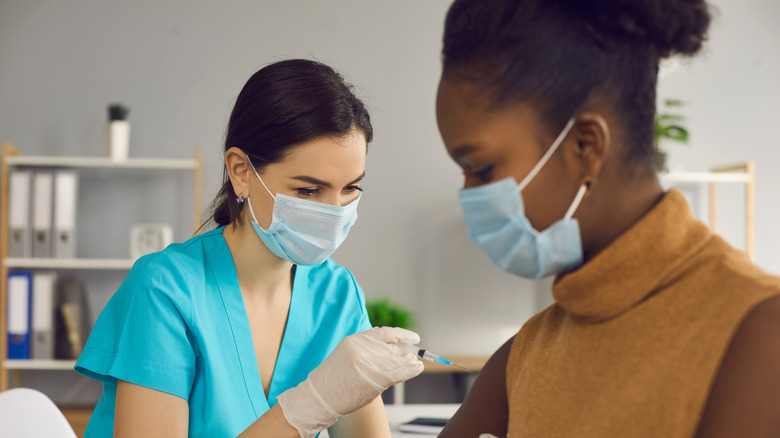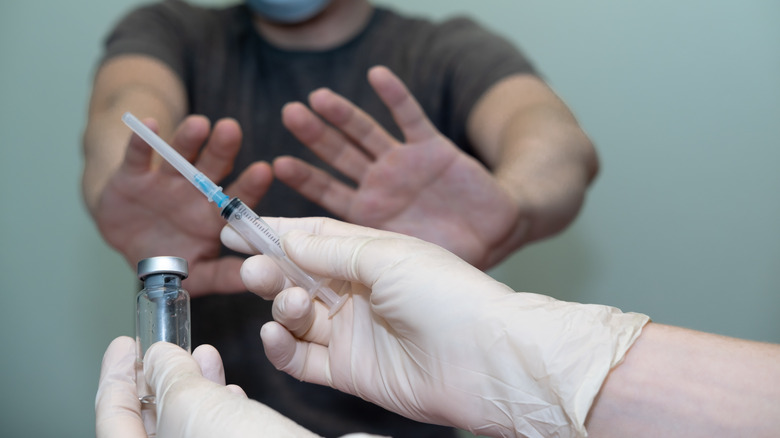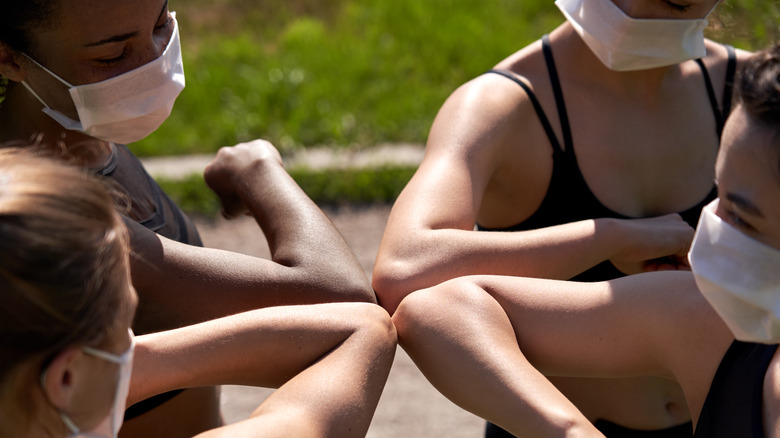Why Vaccine Effectiveness May Depend On How Strong Your Immune System Is
According to CNN, your body is protected from Covid-19 for 3 to 4 months after receiving your last dose of a vaccination and booster shot, but the chances of being hospitalized or dying from Covid-19 are still minimal. A study published on April 22 in The Lancet Respiratory Medicine found that the protection vaccinated adults receive largely depends on their immune system. The study showed that the vaccine's ability to protect immunocompromised people from hospitalization dropped from 85% to 55% three months after receiving the last dose. However, the effectiveness didn't drop for people who had a normal immune system.
The reason being is that defense against Covid-19 (and, really, any virus) starts with antibodies, but that's not where it ends. Antibodies are the Marines of your immune system. When it comes to fighting disease, antibodies are the armed forces watching out for an enemy. Should anything harmful try to infiltrate your body, antibodies wage an attack. Over time, as the infection or vaccine subsides, antibodies gradually decrease. However, B and T cells remember what the virus or vaccine looks like. That way, if that pathogen tries to attack again, those cells can generate another antibody army.
Your antibody army isn't built overnight. Be it Covid-19 or another virus, having a strong immune system is key to ensuring your body is ready for battle (per Medical News Today).
Natural immunity does offer some protection
According to a study published on April 20 in JAMA Network Open, unvaccinated people who catch Covid-19 and recover are 85% less likely to get it again. Additionally, those with symptoms will produce more antibodies, reports CNN. While this may sound like a valid reason to not get vaccinated, the risk is that those symptoms can develop into serious complications that can lead to death, especially if you're older or have an illness. Per WebMD, some of those complications include acute respiratory distress syndrome or failure, pneumonia, acute injury in the liver, heart, or kidney, secondary infection, septic shock, blood clots, chronic fatigue, and more.
Another important factor to consider is which variant of Covid-19 you had. On March 31, a study was published in The New England Journal of Medicine which found that even though prior infection of Alpha, Beta, and Delta variants resulted in 90% protection against reinfection, it's only 56% effective against Omicron. These studies show that neither vaccination nor natural immunity alone is the sole answer. The two work in tandem.
"Covid is a high-risk, high-consequence way of getting immunity," NYU transplant surgeon Dr. Dorry Segev told CNN. "But if you had Covid and you went through that and you have immunity, that is something we need to respect."
3 ways to boost your immune system
Healthline explains that there are several ways to boost your immune system and help your body have enough strength to fight off sickness and disease. One of them is to get enough sleep. A 2015 clinical trial published in Sleep found that healthy adults who slept less than 6 hours every night were more susceptible to catching a cold than those who received more than 6 hours of sleep each night. Knowing your sleep chronotype can help you create a sleep routine that allows you to rest well.
While you don't have to go vegan, eating more fruits, vegetables, nuts, seeds, and legumes can fill your body with the antioxidants it needs to fight. A 2016 review published in Current Pharmaceutical Design showed that antioxidants found in plant-based foods can reduce inflammation. According to Cleveland Clinic, inflammation is the root of a host of conditions including asthma, arthritis, cancer, and Alzheimer's disease.
Exercising is also good for the immune system. In fact, working out after getting vaccinated for 90 minutes can increase your antibodies, boost your immune response, and enhance vaccine effectiveness. A 2015 review in Progress in Molecular Biology and Translational Science said that moderate exercise like brisk walking, bike rides, or swimming on a regular basis can help improve immune health functioning.



